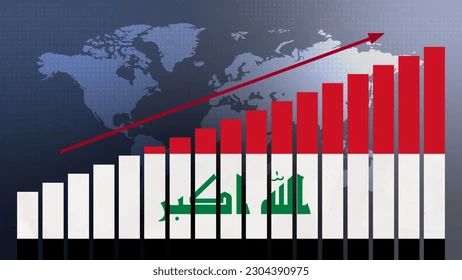A pivotal development in Iraq’s economic landscape is the historic increase in its gold reserves, reaching an all-time high of 151.60 tonnes in the second quarter of 2024. These reserves serve as a backbone for a stable economy, providing a solid foundation for the country’s development plans.
Iraq’s economy has been gradually recovering, supported by strong oil revenues and accommodative policies which with a stable currency supported by such substantial gold reserves, Iraq presents a unique opportunity for investors seeking security and growth potential. The timing for market investment is particularly opportune as the country embarks on a series of economic reforms aimed at fostering sustainable growth.
Historically, Iraq’s economy has been heavily dependent on oil, which constitutes approximately 90% of government revenue.
Al Sudani’s administration is exploring untapped sectors such as agriculture and tourism. Iraq’s fertile land and rich cultural heritage provide vast opportunities for economic diversification, with religious tourism offering significant potential for growth. Investing in infrastructure and tourism development is essential to fully capitalize on these opportunities.
A critical challenge to Iraq’s economic growth is its identity crisis, marked by inconsistencies between state-led economic policies and a shift towards capitalism. Economist Ahmed Abdrabbuh emphasizes the need for a cohesive economic vision to reduce oil dependency and promote sustainable growth.
Reforming Iraq’s public sector, which is characterized by inefficiencies and overstaffing, is essential. Former Deputy Chairman of Baghdad’s Chamber of Commerce, Hassan al-Sheikh, highlights the importance of activating the private sector to drive job creation and economic development. Encouragingly, Iraq has made progress with new factories producing ceramics, dairy products, and poultry, contributing to a burgeoning export market.
A cornerstone of Iraq’s reform agenda is revitalizing the energy sector. The administration aims to end gas flaring by 2028, which will save billions of dollars and reduce environmental harm. Plans to transform Baiji into a regional petrochemical hub further illustrate Iraq’s ambition to lead in energy innovation.
While Iraq’s path to economic revitalization is fraught with challenges, including political instability and infrastructural deficits, the current reform plan offers hope for a more balanced and resilient economy. The declaration of 2025 as the “Year of Iraqi Industry” marks a pivotal moment in Iraq’s journey, reflecting a commitment to local production and economic resilience.
For investors, the combination of Iraq’s substantial gold reserves, ongoing reforms, and strategic focus on diversification makes this an ideal time to invest. As the nation implements these changes, it stands poised to become a formidable player in the global economic arena, offering a compelling opportunity for those looking to participate in its financial transformation.


